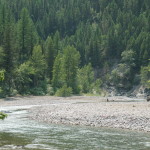The scene is a familiar one. You’re in a room full of people you don’t know, and your friend who brought you there has disappeared. You’re standing just far enough away from the buffet table to keep from looking like you’re hovering, but still close enough that you’re plausibly browsing the options rather than just standing in the corner comparing shoe laces. You’re clutching a Manhattan.
You’re doing a good job keeping your head low and not making any unnecessary eye contact until you reach for the last bacon wrapped date at exactly the same time as the fat man to your right. Now you’ve done it. You each go through the ceremony of offering the vittle to the other, and before you know it you’re stuck exchanging small talk with a stranger.
You’re doomed.
The conversation starts with how you got to that room, whom it is you know in common, and how much colder fifty degrees feels in the fall than in the spring. You touch on how daylight savings time always catches you off guard and maybe you exchange names. Then he asks, “and what do you do?”
What do you do for a living? What do you do for fun? How do you spend your free time? Or is this bacon-date sniping man mostly interested in how, in a single breath, you can convey to him your identity? The question is unclear.
What do you do? If you’re anything like me, then mostly you sleep. That’s an unsatisfying answer for a cocktail party. What do I do for work? Paperwork, I guess, reams of it. And wade through a latticework of bureaucratic absurdity that sits somewhere between the Orwellian and the Kafkaesque. That’s also an unsatisfying answer, apparently. The question is one that I struggle with.
“I like to ski,” I said once at a cocktail party to a small audience, and was greeted with raised eyebrows.”I try to ski a lot,” I insisted. I think they meant to ask what I did for work. But I don’t necessarily identify with what I do for work, and that’s common.
We face a social pressure to label ourselves with our professions, rather than our passions. Partially, this is because our passions are intimate, and strangers at a party haven’t earned the right to know us that well. Identifying with our LinkedIn Profiles is an easy defense mechanism. In doing it, though, we sell ourselves short.
By simplifying our existence to how we occupy the hours between 9 and 5, we fail to legitimize our other talents and interests; we fail to acknowledge the traits that make us individuals.
I’ve told strangers that I’m a geologist. That I do paperwork, or ski, or work in water rights. I’ve lied and said I’m a hunting guide, just to make the conversation more interesting. I’ve told people I’ll never see again that I promote bicycle races, or that I’m a hydrologist, or that I do environmental restoration work, which is all true. I’ve never said I’m a writer and I’m not sure why.
It’s certainly easier to give flippant response over gin drinks and crab cakes than it is to have a real conversation, and there’s a place for lighthearted small talk. But the tendency to disavow the way we like to spend our time in favor of talking about the way we pay our bills is a dangerous standard to set.
If we’re not careful, we might just start to believe that how we make our money is who we really are.
My Favorite Thing
I like the way puddles freeze at night. Ice grows on the surface and the water leaks out through the ground and an opaque shell stays behind ... Read more
Skiing Isn't Epic: a discourse on discourse
"Oh, I think I get it," my dad said. "They're like cold surfers." It was the morning after Thanksgiving. The family had trickled down to ... Read more



One thought on “What do you do?”